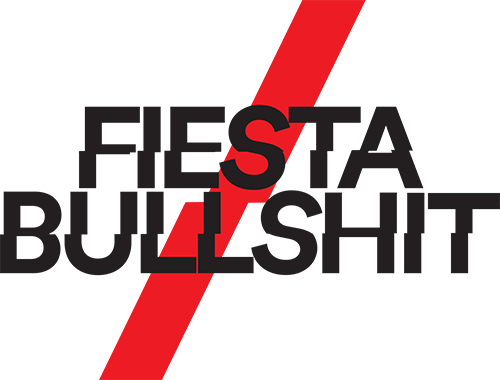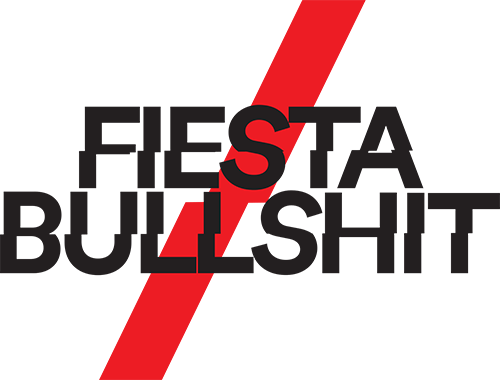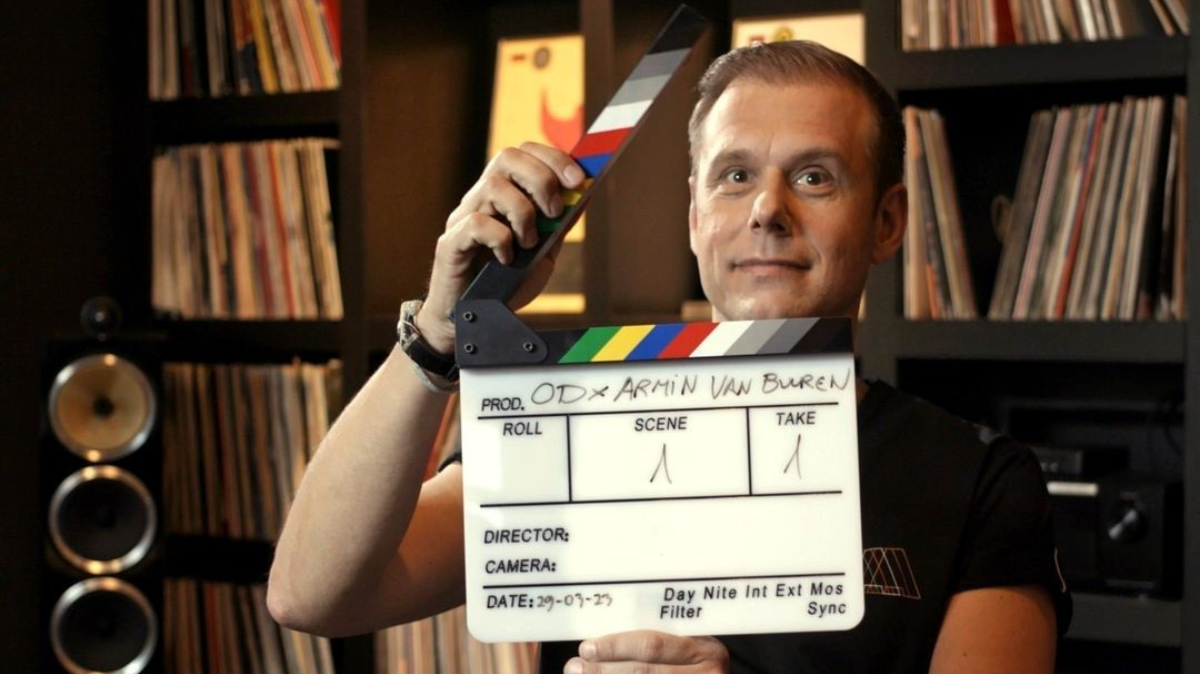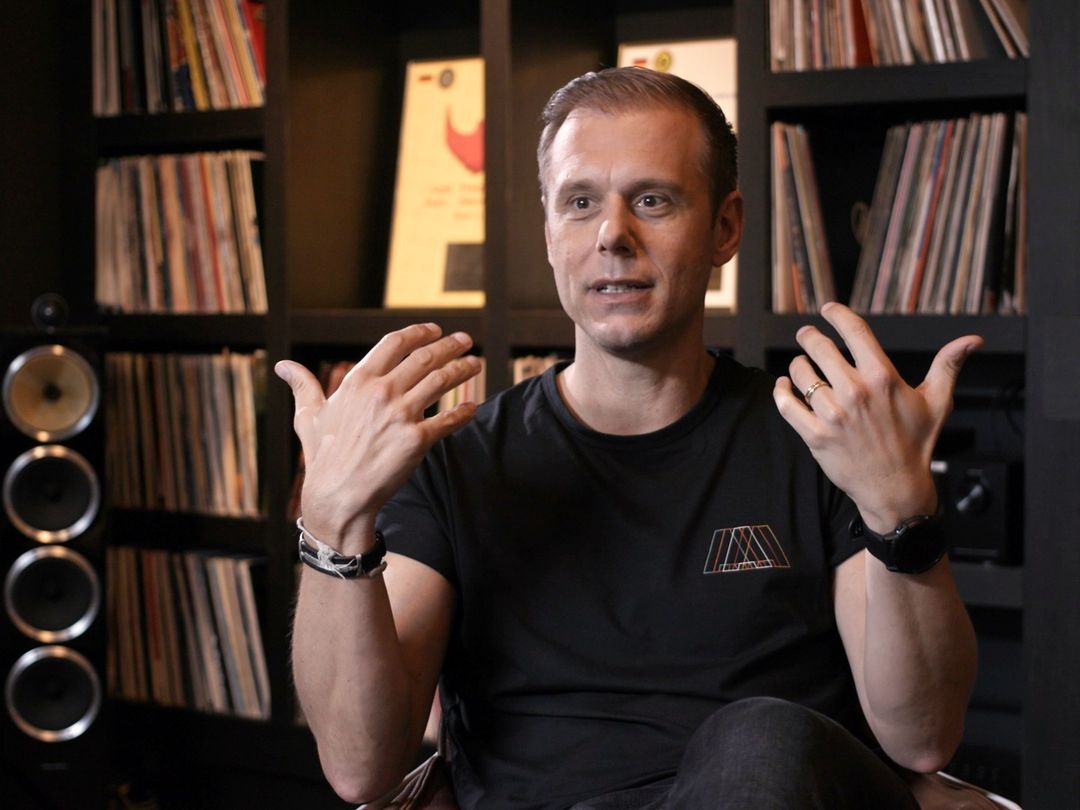ARMIN VAN BUUREN: “IBIZA IS DEFINITELY ONE OF THE HOTSPOTS FOR MUSIC”.
What did you want to be when you were little?
When I was little, I wanted to be a doctor like my father. I dreamed of studying medicine, but in the Netherlands, we have a lottery system to study medicine with fixed numbers where only 1500 students are admitted. Unfortunately, I was number 4200, so I had no chance of becoming a doctor. I decided to study law and started DJing as a hobby and to earn some money, you know.
You said you started DJing as a hobby. Can you explain the process until you made a living out of it?
I started DJing in 1996 and was paid 60 guilders, which is now 20 euros, for 7 hours each week, and had to clean the bathrooms afterward. But I loved it, and I was also producing. The club where I started was very small. I think it was only this room, and its maximum capacity was about 100 people, meaning it was full. That was it; that’s how I learned to DJ. If you play at a party with 1000 people who know your name and music, they get very excited. But when you play in a half-empty club, with people who don’t dance, that’s when you learn how to entertain the audience. So, I am very happy. And during those nights, I was also testing my new music. I was already a producer, and I was making my first tracks that I played in my DJ sessions to see if people liked them. And that’s how I started releasing my music on small labels in Amsterdam and my hometown, Leiden. The tracks became more and more successful, and that’s how I’m sitting here right now.
According to Wikipedia, your genre is trance, psychedelic trance, vocal trance & progressive trance house. Do you recognize yourself with this, or how would you describe your style?
I know that many people have tried to tag me. They often tag me as trance, psychedelic trance, progressive trance. Even sometimes techno. But I think if I have to choose, my sound is trance. I mean, my radio program is called State of Trance, and I’m not ashamed to call it that. It is what it is. It’s melodic. But you know, if people want to call it house, that’s fine. I think it all depends on the emotion and if you like the music, you know? So, for me, it doesn’t matter.
When and where was the first time you played in Ibiza?
The first time I played in Ibiza was in 2000 for Judge Jules at Judgment Sundays in Eden in San Antonio. It was the first time, and I remember I had to play after Judge Jules, which was always difficult to do because he was very popular. The whole club was full, full, full of English people, and I entered, and half of the people left, not because they hated me, but because Jules was more popular at that moment.
How do you remember the island when you arrived, and what was the audience like at that time?
When I arrived in Ibiza for the first time, it was definitely different. It was much smaller, there were no roads, and I remember, I have to be honest with you, I didn’t fall in love with Ibiza right away. I went there because I heard all this hype, people saying that Ibiza is a magical place, so you have very high expectations, you arrive and say, where is the magic?
I only went to San Antonio and Dalt Vila and didn’t see Ibiza. It took me a couple of years to really understand Ibiza, to understand the Balearic sound, to understand the hippie Ibiza is full of really small places that you have to know and talk to locals to go there. So, I fell in love with Ibiza a couple of years after being there.
Do you still consider the island of Ibiza to be one of the hotspots of the music scene? And how do you think it has envolved?
Ibiza is definitely one of the hotspots for music. I have to say that I think little hippie vibes has changed a lot and unfortunately has become more commercial. Now there are big hotels, when I first arrived in Ibiza there were only small hotels, villas, and things like these. I don’t think it’s bad, it’s normal, people want to be in Ibiza, it’s a special place and many people realize it.
For example, if you go to Brazil, everyone in Brazil wants to go to Ibiza at leats one in their life, it’s their dream for them and I think Brazil is a beautiful country. Why do you want to go to Ibiza? Because people grow up listening music, social media shows Formentera, the parties are so special,… and I think people have the idea that Ibiza is very exotic.
I think what happened in Ibiza is that many people are very nostalgic about the 80s and 90s, the summer of love, the first outdoor clubs,…A kind of hippie thing tat is no longer there, Ushuaïa is a special place when people scream when the plane passes over, Hï, Eden,… Places like these, there is so much that I don’t think you can find another place in the world where there are so many famous clubs and even if you don’t want to go to a massive club, it’s full of small parties in Ibiza: small clubs, small events, techno DJs during the day… It’s still a magical place.
Ocean Drive Ibiza is celebrating its 25th anniversary, what does this hotel mean to you?
I have been to Ocean Drive. Being a resident D in Ibiza for 16 years I started Eden, I was at Amnesia for 10 years, I played at Privilege, Space, Hï, Ushuaïa and every time I stayed at Ocean Drive Ibiza.
I stayed with my daughter when she was little and we brought her to the island and I stayed at Ocean Drive Ibiza because it’s like coming home always. If you come to Ibiza and see the people form Ocean Drive, it’s like being in your second home and I love that.
When you are a DJ, you travel a lot, what do you expect from a hotel?
I don’t have great demands, I think for me, who travels a lot, I’m tired, have jet lag… The really important thing is to be quiet, not too much noise, a good internet and a good shower. A good shower is super important because before I go to sleep, I always take one. The room service at Ocean Drive is very good, they always have an incredible Iberian ham, it’s my favorite. Also, a good gym, for me, is important, I try to train outside if I can, good access to the pool or the beach since if I have an hour to spare, I always go for a swim. For me, these are the most important things when I’m working and staying at a hotel. If I’m with my family, it’s different but if I’m working, this is the most important thing.
Your radioshow State of Trance is very popular. How did the project start and what is the key to its success?
My radioshow was born in 2001 when someone asked me to do a two-hour program about trance music, and I was like “I don’t know if I can do that” I grew up listening to the early sounds of dance music on the radio, and I got to know new music through the radio, so I’ve always liked it.
When I was 16/17 years old, I couldn’t go to clubs yet because I was too young. I listened to all those radio programme, and I promised myself that someday, if I had to chance, I would do my own radio program, and so I did on June 1, 2001, and now we’re on episode 1114, so more than 20 years passing every week. The radio program started in Dutch; we started in Amsterdam on a small local radio station without internet or broadcasting, and now it’s ans online program that reaches many countries arounf the world, and I do it in English. We also hace ir on YouTube where fans can watch us make the program every week. We invite fans to the radio program to play new music on it.
It’s still the same formula but with new music every week, ans it’s something that I’m really proud of, and I use the program as the center of everything I do: to present new music, talk about my DJ sets, play tracks that I’ve heard in Ibiza, talk to fans on my radio program, ans the respond to me through social media, and it’s really cool to have that interaction with the fans, so State of Trance is super important to me.
What would you say to someone who is starting out as a DJ? What would you have liked to hear when you started?
If you’re starting out as a DJ right now, you know that times are very different from when I started because when I started DJing for the first time, there was only vinyl, that was the only thing there was. Now, anyone can do it with a USB, it’s a big change, but I think it really depends on where you want to be as a DJ.
If you want to be a Superstar EDM DJ and play on all the main stages of the big festivals, the fastest way to make hits is not necessarily to make hits on the radio, but it does help your career if people hear your music on the radio, that’s the fastest way. If people can find your music on streaming, it can help you have a radio program, make compilations, have a presence on social media, and I think it’s important that you have a good professional team to help you record all the performances… and I think that’s where you have to start.
Who do you like to share the djbooth?
I love to share the djbooth, in fact, I was in Miami playing b2b with Ferry Corsten, also with Oliver Heldens. This summer I had b2b with David Guetta at Ushuaïa, it was a great night. Can I play a b2b with almost anyone. I would love to do a b2b again with Ferry.
Project, future ideas… That you can share with us.
I’m working on many projects at the moment, this week I’m releasing my new album called “Feel Again Us” with 34 tracks. I have already released the first and second part, and this week I am going to release the third part, so there are a total of 34 tracks. I’m very excited about my new single with Punctual and Alika, and I have already finished my next singles for after the album, so there is a lot on the way. I can also tell you that I have started working on State of Trance 2023, my new compilation that will be released in May, and we are going to do another State of Trance Festival this time in London on July 2nd. And of course, I’m super excited to be back in Ibiza, in September I’m going to play on Sundays at Ushuaïa, so I’m very excited about all of this.
What do you feel when you go out to play in front of thousands and thousands of people?
When I play in front of so many people, I still get nervous, it sounds silly at the same time, but yes, like this weekend at the Ultra Music Festival. There were so many people that you just want to play perfect sets, and it’s always difficult to please everyone. But I just tell myself that I have to be in the moment and enjoy it because it’s something I have to be very, very grateful for that so many people come to see my show and listen to my music. It’s amazing that people appreciate what you do, it’s something that I will be incredibly grateful for.
Can you tell us what song is your favorite and that you can’t help but dance to?
There are many tracks that I love, I’m a big music lover so I have a huge collection of music at home. I like early dance music, some tracks like Donna Summer’s “I feel love,” for example, because it’s one of the songs that started it all.
What has been the most exciting moment you have experienced in your career? The most exciting moment in my career so far was in Amsterdam in 2017. I was at the stadium and we did something called “The Best of Armin Only,” and I played for 4 and a half hours. It was special because I played all my big hits, with all the artists singing live. My parents were there, my brothers, my friends, and my fans. I didn’t travel around the world, but the world came to me, and the whole show is on my Youtube channel, and you can see that it was the biggest thing I’ve ever done.
How do you see electronic music in 25 years?
I remember when I started as a DJ in 96-97 and many people asked me if dance music would last more than 2-3 years. I remember that all the interviews I did in those days asked me, “How long do you think this music will last?” But we’re here, 30 years later, and the music is still here.
So if I have to guess, I think electronic music will evolve, I think the development of artificial intelligence will be super important for the creation of electronic music. I think AI will help us create new music, I think dance music will always be there, and that electronic music is now the basis of a lot of popular music.





